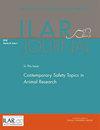The Pursuit and Advancement of Knowledge as a Justification for the Use of Animals in Research.
IF 3.1
3区 农林科学
Q1 VETERINARY SCIENCES
引用次数: 4
Abstract
It is commonly said that animal research is sometimes ethically appropriate because it can lead to knowledge, irrespective of benefits this knowledge might bring to humans or animals. Proponents of this view, which I call the "knowledge justification," have been unclear about what they mean by the term "knowledge." They also omit from the justification other features of animal research that are intimately connected with the pursuit and advancement of knowledge. This article identifies and includes in a modified knowledge justification 5 general elements of the pursuit and advancement of knowledge in animal research: "knowledge" in the sense of facts, information, or explanations; "knowledge" in the sense of the experience of having knowledge; contemplation; the exercise of intellectual faculties and skills; and pleasures, frustrations, and challenges in the pursuit and advancement of knowledge. The article explains why these elements are valuable and must be given weight in assessing the ethical appropriateness of curiosity-driven animal research. The discussion critiques defenses and applications of current expressions of the knowledge justification. The article offers a preliminary defense of curiosity-driven animal research by arguing that using animals to obtain scientific knowledge and the pleasures of scientific inquiry can be far more valuable for humans and no more harmful to some animals than the use of these animals to produce meat for human consumption. The article presents 2 examples of curiosity-driven animal research to further establish the plausibility of the knowledge justification and suggests questions and guidelines for developing the justification.对知识的追求和进步作为在研究中使用动物的正当理由。
人们通常说,动物研究有时在伦理上是合适的,因为它可以带来知识,而不管这些知识可能给人类或动物带来什么好处。这种观点的支持者,我称之为“知识辩护”,一直不清楚他们所说的“知识”是什么意思。他们还从辩护中忽略了动物研究与追求和知识进步密切相关的其他特征。本文在修改后的知识论证中确定并包括了动物研究中追求和推进知识的5个一般要素:事实、信息或解释意义上的“知识”;“知识”指的是拥有知识的经验;沉思;智力:对智力和技能的运用;在追求和进步知识的过程中,有快乐、挫折和挑战。这篇文章解释了为什么这些因素是有价值的,并且在评估好奇心驱动的动物研究的伦理适宜性时必须给予重视。讨论批评了当前知识辩护表达的辩护和应用。这篇文章为好奇心驱使的动物研究提供了初步辩护,认为利用动物获得科学知识和科学探索的乐趣对人类来说可能更有价值,对某些动物来说也不会比利用这些动物生产供人类食用的肉更有害。本文提出了两个好奇心驱动的动物研究的例子,以进一步建立知识证明的合理性,并提出了发展证明的问题和指导方针。
本文章由计算机程序翻译,如有差异,请以英文原文为准。
求助全文
约1分钟内获得全文
求助全文
来源期刊

Ilar Journal
农林科学-兽医学
CiteScore
5.10
自引率
20.00%
发文量
8
审稿时长
>18 weeks
期刊介绍:
The ILAR Journal is the peer-reviewed, theme-oriented publication of the Institute for Laboratory Animal Research (ILAR), which provides timely information for all who study, use, care for, and oversee the use of animals in research. The journal publishes original articles that review research on animals either as direct subjects or as surrogates for humans. According to policy, any previously unpublished animal research reported in the ILAR Journal will have been conducted according to the scientific, technical, and humanely appropriate guidelines current at the time the research was conducted in accordance with the Guide for the Care and Use of Laboratory Animals or other guidance provided by taxonomically-oriented professional societies (e.g., American Society of Mammalogy) as referenced in the Guide.
 求助内容:
求助内容: 应助结果提醒方式:
应助结果提醒方式:


